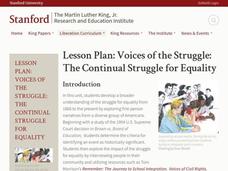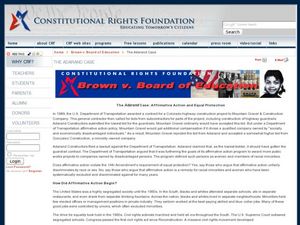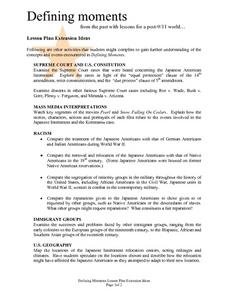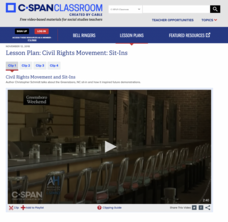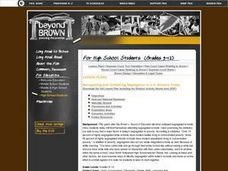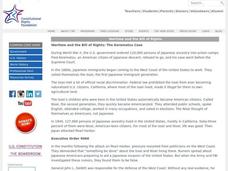C-SPAN
Voting Discrimination and the Effects of Shelby County v. Holder
Show students that every vote counts as they debate the federal government 's role in protecting voting rights in historically racially discriminated areas. In the Supreme Court case Shelby County v. Holder, the high court found that...
C-SPAN
14th Amendment Equal Protection Clause
Two Supreme Court cases, Plessy v. Ferguson and Brown v. Board of Education take center stage in a lesson about the Equal Protection Clause of the 14th Amendment. Class members research both cases to compare and contrast the rulings.
Teaching Tolerance
Using Photographs to Teach Social Justice | Confronting Unjust Practices
A powerful photograph of the Freedom Riders of 1961 launches an examination of the de jure and de facto injustices that the civil rights movement of the 1950s and 1960s addressed. Young historians first watch a video and read the Supreme...
EngageNY
Studying Conflicting Interpretations: Perspectives on Plessy v. Ferguson: Part 2
The Plessy v. Ferguson case was influential in establishing segregation in the United States. Scholars continue reading the court's decision in the case, seeking to understand the key reasons the court came to its decision. Pupils also...
National First Ladies' Library
The History of Jim Crow: Legal Racism in America
Students study the history and culture of Jim Crow, as well as the scope of Jim Crow laws across the United States. They consider the concepts of terror and triumph with respect to the history of Jim Crow, the recognition of evidence of...
Curated OER
In the Courts
Students explore desegregation in the courts. In this civil rights lesson, students listen to their instructor present a lecture on Supreme Court cases Brown v. Board of Education and Plessy v. Ferguson. Students examine the cases and...
Newseum
Compare Coverage of Brown v. Board Ruling
Young journalists analyze how The Topeka State Journal, the Jackson Daily News, and The Providence Journal reported on the 1954 Supreme Court decision in Brown v Board of Education. Scholars scrutinize the headlines, photographs,...
Stanford University
Voices of the Struggle: The Continual Struggle for Equality
As part of a study of the Civil Rights Movement from 1868 to the present, class members examine first person narratives, the Supreme Court case Brown v. Board of Education, and other significant events in civil rights history. They then...
Anti-Defamation League
The Problem We Still Live With?
Norman Rockwell's painting "The Problem We Still Live With" launches a unit study of racism in the United States and segregation in U.S. schools. In the first lesson plan, scholars discuss the painting, review key elements of the Supreme...
EngageNY
World Cafe: Analyzing the Jim Crow Laws
The Plessy v. Ferguson Supreme Court case connected to the Jim Crow laws. Scholars explore the topic using the World Café protocol to analyze specific Jim Crow laws. They discuss how the laws relate to Plessy v. Ferguson and their...
Anti-Defamation League
The Road to Brown
As part of the study of segregation in U.S. schools, scholars research and create a timeline of events that led to the historic Supreme Court case, Brown V. Board of Education. Groups research a topic or event that led to the decision,...
Anti-Defamation League
Sixty Years Later
Has any progress been made in desegregating schools since 1954's Supreme Court case Brown v. Board of Education? To find out, class members examine charts and graphs representing U.S. schools' racial, ethnic, and socioeconomic...
Curated OER
Racism, Discrimination, and the Law
Seventh graders examine the various racism and discrimination faced by various ethnic groups in the United States. In groups, they research the legal system and describe the purpose of the United States Constitution. They review cases...
Curated OER
In Search of Rights
Seventh graders research Supreme Court cases. They formally debate court rulings, write a scenario portraying a possible futuristic America and participate in a field practicum for media production, while evaluating various social,...
PBS
Ken Burns: Jackie Robinson - A Journey Back to Separate but Equal Conditions
Baseball great Jackie Robinson fought for social justice. His efforts to push for equal access are detailed in an episode from from the Ken Burns: The Jackie Robinson Collection. After viewing the clip, class members engage in a series...
Teaching for Change
A Documents-Based Lesson on the Voting Rights Act
How did the Voting Rights Act affect the daily lives of American citizens? A document-based lesson developed by the Student Non-Violent Coordinating committee (SNCC) presents a case study of the impact of the Voting Rights Act of 1965 on...
Curated OER
Civil Rights and the Michigan Supreme Court I: A Case of Racial Discrimination in the late 1800s and Minority Supreme Court Justices
Students read the decision of the Michigan Supreme Court in the Ferguson v. Gies, a case dealing with discrimination in a restaurant. They participate in a class discussion about the case and the justices that presided over it. They...
EngageNY
Studying Conflicting Interpretations: Perspectives on Plessy v. Ferguson: Part 1
Scholars begin building background knowledge about Plessy v. Ferguson by watching a video about the landmark Supreme Court decision. They engage in discussions to analyze the case's importance and deepen their understanding of issues...
Curated OER
The Adarand Case: Affirmative Action and Equal Protection
Eleventh graders examine the Adarand case. In this American Government lesson, 11th graders create a list of reasons for each affirmative action program. Students develop a defense on certain issues and present it to the class.
Curated OER
Defining moments from the past with lessons for a post-9/11 world...
Students examine extension ideas concerning 9/11, Defining Moments. They analyze a variety of Supreme Court cases, the U.S. Constitution, Mass Media Interpretations, Racism, Immigrant groups and U.S. geography. Many questions are asked...
Curated OER
Lee Yick: Fighting Racism
Students study the 14th Amendment, then review and analyze a Supreme Court brief. There was much racism exhibited toward the Chinese immigrants by the European Americans; this came in the form of institutional racism and mob violence....
C-SPAN
Civil Rights Movement: Sit-Ins
Part of the protests of the Civil Rights Movement were small scale sit-ins at lunch counters. This form of on-the-ground activism is the focus of a C-SPAN resource that includes four video-clips about the sit-ins by pupils at a lunch...
Curated OER
Recognizing and Combating Segregation in U.S. Schools Today
High schoolers explore the prevalence of racism and statistical segregation in America's schools. They design a project to investigate how the racial makeup of their school compares to other schools. In addition, they evaluate their...
Curated OER
Wartime and the Bill of Rights: The Korematsu Case
Students examine the balance between civil liberties and protection. For this national security lesson, students explore the Korematsu case which references the Japanese internment camps of World War II. Students draw comparisons between...









